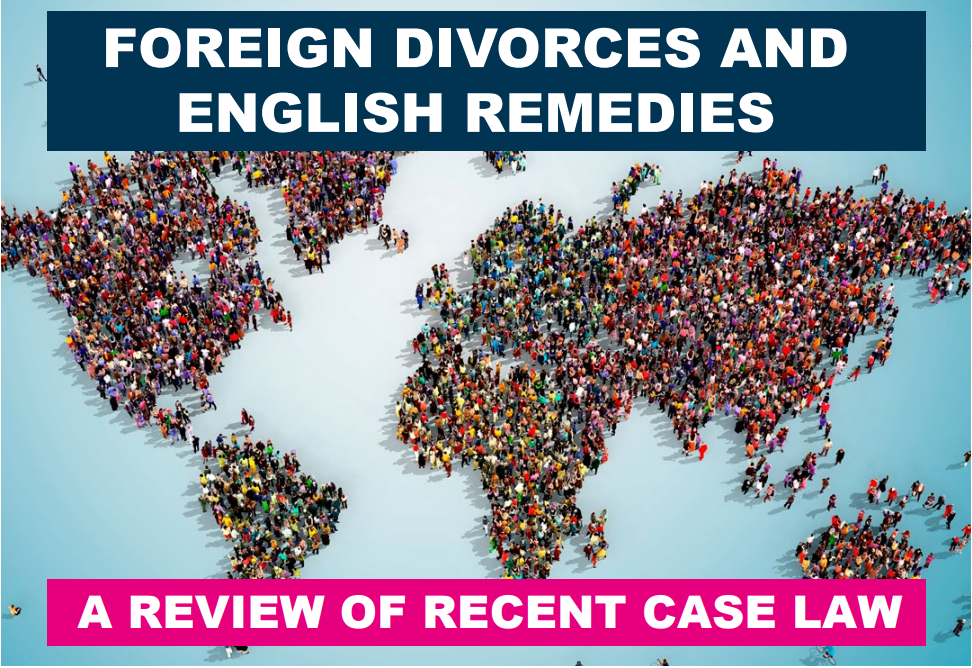Knowledge Hub
Join the Conversation!
Impartial and independent, ThoughtLeaders4 HNW Divorce Knowledge Hub hosts cutting edge industry content and insight.
Email maddi@thoughtleaders4.com to submit content.
Foreign Divorces And English Remedies: A Review Of Recent Case Law
Date: 05/01/2022 Type: Articles Community Magazine Topic: HNW Divorce | ADR | Children | Client Perspective | Finances | Modern Family | Remote Hearings | Arbitration | Private FDR’s | Early Neutral Evaluations |Recognition of a foreign divorce
Whether a foreign divorce is recognised under English law will determine whether a petition for divorce (and the associated remedies) can be pursued or merely a claim under Part III. The Family Law Act 1986 set outs the circumstances in which recognition of overseas divorces will be granted or refused. Section 46 (s46) sets out the grounds for recognition as follows:-
The validity of an overseas divorce, annulment or legal separation obtained by means of proceedingsshall be recognised if:
a) The divorce, annulment or legal separation is effective under the laws of the country in which it was obtained; and
b) At the relevant date, either party to the marriage must satisfy the following:
i. Was a habitual resident in the country in which the divorce, annulment or legal separation was obtained; or
ii. Was domiciled in that country; or
iii. Was a national of that country.
The validity of an overseas divorce, annulment or legal separation obtained otherwise than by means of proceedings shall be recognised if:
a) The divorce, annulment or legal separation is effective under the law of the country in which it was obtained; and
b) At the relevant date:
i. Each party to the marriage was domiciled in that country; or
ii. Either party to the marriage was domiciled in that country and the other party was domiciled in a country under whose law the divorce, annulment or legal separation is recognised as valid; and
iii. Neither party to the marriage was a habitual resident in the United Kingdom throughout the period of one year immediately preceding that date.
• Please note that the “relevant date” refers to:
a) In the case of an overseas divorce, annulment or legal separation obtained by means of proceedings, the date of the commencement of the proceedings; and
b) In the case of an overseas divorce, annulment or legal separation obtained otherwise than by means of proceedings, the date on which it was obtained.
Unfortunately, where the s46 criteria are not observed, a divorce which is perfectly valid overseas, may nevertheless be refused recognition under English law creating the unsatisfactory situation that a couple divorced in one jurisdiction may remain married in another. Perhaps unsurprisingly, the need to comply with the s46 criteria is not always known to those divorcing overseas without the benefit of legal advice. The difference in status may have significant consequences not only for the financial relief available under English law, but also on ancillary matters such as their immigration status, or ability to re-marry. The following cases demonstrate the general approach to questions of recognition.
In Botwe v Brifa 2021 EWHC 2307 Fam, the court was tasked with determining the factual dispute as to whether a valid divorce had taken place at all, pursuant to Ghanaian law and, if so, whether that divorce satisfied the s46 criteria for recognition or not.
W and H had married pursuant to local customs in Ghana and H asserted that they had divorced in the same manner. It was H’s case that W had participated in the divorce proceedings (albeit that she was not physically present) but that she now sought to deny this for immigration purposes. The court accepted H’s evidence on this point and further accepted expert evidence that W’s physical absence from the divorce ceremony did not invalidate the divorce under Ghanaian law.
Having concluded that there had been a valid divorce pursuant to Ghanian custom, the court went on to consider whether it fulfilled the s46 criteria. The first step was to determine whether the parties have divorced by way of proceedings or otherwise. The expert evidence was that although it is commonplace to register a customary divorce in Ghana, registration was entirely optional and formed no part of the divorce process itself.
In the absence of any registration requirement, the court found that the customary divorce had proceeded “other than by means of proceedings”. As set out above, such divorces may only be recognised if neither party had been habitually resident in the UK in the two months prior to the divorce.
As both W and H accepted that they had been living in the UK, the Ghanaian divorce could not be recognised in the UK. As a result, W was free to pursue relief in the English courts.
In Hussain v Parveen 2021 EWFC 73, revisited the question of when a divorce will be an “overseas” divorce for the purposes of s46.
The case concerned W’s petition for divorce from her second husband. H sought to persuade the court that W’s first divorce was not an “overseas” divorce within the meaning of s46 at all, but was in fact transnational and therefore could not be recognised as valid under English law.
W had married her first husband in Pakistan in 2000. They later divorced as a result of H failing to make arrangements for W to join him in the UK. The divorce was obtained by the first husband pronouncing Talaq via a letter to W’s brother in the UK, which in turn, was converted into a divorce certificate by an English mosque. W then received a copy of the divorce in Pakistan and provided a copy to the local union council in Pakistan.
Having effectively divorced under the law in Pakistan, W remarried and later relocated to the UK with her new spouse. Sadly that marriage also came to an end and it was as a result of this second divorce that the validity of the first (under English law) came into question.
W’s second husband argued that the Talaq (which took place in the UK) and delivery of the divorce certificate to the union (in Pakistan) were both integral parts of the divorce. It followed that whilst the process had concluded in Pakistan, it had begun in the UK and could not be considered an overseas divorce pursuant to s46.
The court accepted H’s submission, in line with previous authority that dealt with a transnational get. The court accordingly declared W’s second marriage a nullity, as a result of the fact that her first marriage was still subsisting under English law. This conclusion had little impact on W’s ability to obtain financial remedies, but left her open to significant consequences within her religious community where polyandry was a religious offence.
Finally, in J v J 2021 EWFC 43, whilst there was no question that the Chinese decree obtained by H met all of the s46 criteria, the court was invited nonetheless to refuse recognition pursuant to section 51 of the Family Law Act 1986.
In this case, the wife had issued English divorce proceedings in May 2019. However, by the time the matter came before Mr Justice Peel in 2021, decree nisi was still yet to be pronounced owing to a combination of court delays and H’s evasion of service. By this time, H had himself petitioned for, and obtained, a decree of divorce in China in October, 2019. Thus rendering W’s application untenable unless the court refused to recognise the pre-existing Chinese decree.
As such, W’s only option was to demonstrate that H had failed to take reasonable steps to notify her of the proceedings or that the decree was obtained without W having been given a proper opportunity to participate in proceeding pursuant to section 51(3)(a) of the Family Law Act 1986.
The court accepted W’s evidence that she had been unaware of the Chinese proceedings prior to April 2020. That said, as the matter was not finally disposed of until December 2020, Mr Justice Peel concluded that W had not suffered any prejudice as a result of the initial delay. Further, although the court accepted W’s evidence that she had not received any other emails regarding the proceedings, it was apparent that she was aware of at least some of the hearing dates and yet failed to obtain advice or attend.
The court was satisfied that H was entitled to use the email address which W had held for many years –an address which had been effective in communicating the April hearing date. No more could be expected of H, and it would be wrong to refuse to recognise the decree he had properly obtained in such circumstances.
The court noted that in these circumstances, W would almost certainly be able to avail herself of a claim udder Part III given the limited scope for financial remedies in China following divorce. However, the failure to obtain an English decree could have had significant consequences had a different jurisdiction been in issue.
In Potanin v Potanina, the court was concerned with an application under Part III. This followed hard fought proceedings in Russia over a four-year period. Although W had been awarded 50% of the matrimonial assets in those proceedings, and significant child care expenses, the final award failed to take into account assets beneficially owned by H which represented the vast bulk of his wealth. As a result, in 2019, W sought leave to apply by relying upon the lacuna in Russian law and the inability of the current award to meet her needs as grounds for a Part III claim.
W was able to pursue her claim on the basis that she was habitually resident in the UK having moved there in 2014. W’s application proceeded before Mr Justice Cohen on an ex parte basis as is required. During that hearing the judge expressed a clear view that the matter ought to be re-listed on an inter partes basis before making a determination as to whether to grant W leave. Ultimately however, he was persuaded against that course and leave was granted.
Unsurprisingly, in due course H applied to set aside the judgment alleging that W had misled the court in relation to both fact and the law. H’s submissions clearly made an impression on Mr Justice Cohen who expressed some regret about his failure to list the matter inter partes.
He decided to list the set aside application for a two-day hearing, contrary to the procedure set down in Agbaje which provides:“Once a judge has given reason for deciding at the ex parte stage that the threshold has been crossed, the approach to setting aside leave should be the same as the approach to setting aside permission to appeal in the Civil Procedure Rules (CPR), where (by contrast with the Family Proceedings Rules) there is an express power to set aside, but which may only be exercised where there is a compelling reason to do so: CPR r52.9(2). In practice, in the Court of Appeal, the power is only exercised where some decisive authority has been overlooked so that the appeal is bound to fail, or where the court has been misled...in an application under section 13, unless it is clear that the respondent can deliver a knock-out blow, the court should use its case management powers to adjourn an application to set aside to be heard with the substantive application.”
At the conclusion of the two-day hearing, Mr Justice Cohen concluded that W had misled the court in three categories: fact, Russian law and English law. On appeal it was reiterated that the procedure in Agbaje cannot be circumvented; in the absence of a knock-out blow the set aside should be adjourned to be listed alongside the substantive application. The Court of Appeal stressed that the need for a two- day hearing in order to demonstrate a compelling reason indicated that those reasons couldn’t be considered a knock-out blow.
Further, it will not be sufficient to show that the court has been misled in some peripheral matter. The respondent must demonstrate that the court was misled in a matter material to the grant of leave itself. The fact that the wife had incorrectly stated the child care award could not be said to be material given that her application invited the court to consider awards in her favour, not the child’s. Similarly, although Mr Justice Cohen had expressed concern that W had described the Russian proceedings (W asserted that the Russian court had failed to assess her needs, rather than explaining that a needs claim was not available under Russian law) the Court of Appeal was satisfied that this did not impact the grounds upon which leave had been granted, namely that the lacuna in Russian had placed significant assets beyond W’s reach and her needs have not been met as a matter of fact.
Finally, the judgment expressed concern that reliance had been placed on a finding that W had failed to inform the court that she had taken advice from divorce specialists in London prior to her relocation in 2014. W had not waived privilege in respect of the advice she received and did not give evidence as to her motivations for relocating. The Court of Appeal was clear that it was not open to the court to draw inferences from W’s refusal to waive privilege and while conclusions could be drawn from W’s evidence at trial, it was not a material consideration at the leave stage.
The take-away:
1.In complex matters, an inter partes hearing will likely be appropriate;
2. Once leave has been granted, any set aside application will be adjourned unless the respondent is able to deliver a knock-out blow within a short hearing for that purpose; and
3. Applicants should be mindful that where a grant of leave is shown to have been inappropriate following a substantive hearing, cost consequences will likely follow particularly where the court has been misled.
Author
Sarah Bailey-Munroe - Conyers
Our HNW Divorce Corporate Partners
















